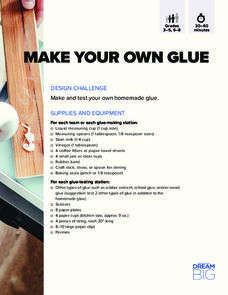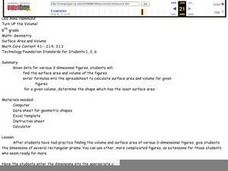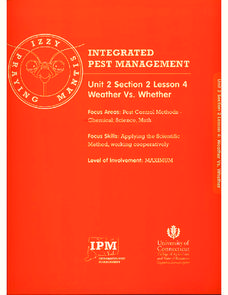American Chemical Society
Density: Sink and Float for Liquids
We don't think of liquids as floating typically, but a quick look at any oil spill tells a different story. Lesson explores various densities of liquids and why this fact is important. After observing the density variation, scholars...
media.yurisnight.net
Science Lesson Plan: Our Solar System: I Wonder?
Ever wonder why Pluto isn't considered a planet? Or how large the Earth is compared to the other inner planets? Explore the universe with a series of projects that simulate different aspects of our solar system. The activities require...
DiscoverE
Bridges, Buildings and Beyond Activity Packet: Grades 6-8
Pour a solid foundation of engineering into the minds of future engineers. Scholars take part in three activities to learn about civil engineering. They build a model of a cable-stayed bridge, conduct an experiment to see the effects of...
NASA
States of Matter
Water, one of the basic needs of humans, is found in all three states of matter on Earth; no other planet—that we know of—possesses this quality. Here is a unit that allows learners to explore through experimentation what it takes to...
American Chemical Society
Density of Water
We know solids have a density we can measure, but what about liquids? Lesson explores this concept and allows scholars to explore the relationship between volume and density. Graphing and analysis questions round out the activity.
Baylor College
Serving Sizes
Are serving sizes for different foods always appropriate for what you need? In this hands-on activity, learners work in groups to estimate what one serving size of various foods are, and then evaluate their hypotheses by measuring real...
Berkshire Museum
Where’s the Water?: Acting Out Science Cycles
Young scientists transform themselves into rivers, oceans, clouds, and drops of water in order to explore the water cycle. After assigning and explaining to students their different roles in the activity, the teacher reads aloud a...
DiscoverE
Make Your Own Glue
You won't regret being stuck with this activity. By mixing a variety of household items, pupils create their own glue. They test the tensile strength of their glue and compare it to that of other adhesives.
Michigan State University
Gases Matter
Young scientists learn that seeing isn't necessarily believing when it comes to the states of matter. After performing a fun class demonstration that models the difference between solids, liquids, and gases, children complete a series of...
University of Colorado
Happy Landings: A Splash or a Splat?
Huygens spacecraft landed on Saturn's moon Titan in 2005, making it the farthest landing from Earth ever made by a spacecraft. In this hands-on activity, the 12th installment of 22, groups explore how density affects speed. To do this,...
Messenger Education
Cooling with Sunshades
Messenger's sun shade measures 8 ft x 6 ft and will have temperatures reaching 700 degree Fahrenheit on the outside while maintaining a cool 70 degrees underneath. In the third activity of four, groups discuss the basic properties of...
Pace University
Volume and Capacity
Differentiated instruction through leveled learning contracts boosts scholars' knowledge of volume and capacity. Participants split into three groups based on ability and interest before choosing three activities from their learning...
Food a Fact of Life
Soup-er!
Is there anything better than hot soup on a cold day? Kids prepare either vegetable chowder or minestrone soup in an activity that features the use of the stove top.
Curated OER
Turn Up the Volume
Measuring volume can be a mystery for 5th graders, but this hands-on activity gives the gift of discovery. The volume of simple rectangular solids and irregular shapes are calculated through various methods including displacing liquid in...
PBS
Blow the Roof Off!
Blow the minds of young scientists with this collection of inquiry-based investigations. Based on a series of eight videos, these "hands-on, minds-on" science lessons engage young learners in exploring a wide range of topics from making...
University of Connecticut
Weather Vs. Whether
Monarch butterfly populations have decreased by 90 percent over the past 20 years due to misuse and ineffectiveness of some pesticides. Given the challenge to increase pesticide safety and effectiveness, the class, through discussion,...
Baylor College
We Need Water
There's nothing quite like a glass of ice-cold, freshly squeezed lemonade. Lesson seven of this series explains how the water humans need to survive can come in many forms. Teach your class about how much water humans require every day...
NASA
Christa's Lost Lesson: Effervescence
How are chemical reactions affected by gravity? Learners explore the phenomenon of effervescence as part of the Christa's Lost Lessons series. They compare findings in an experiment on effervescence to a video of a similar experiment in...
DiscoverE
Core Sampling
Simulate soil sample assemblages. Individuals create soil layers in a cup. They then use straws to collect core samples from these layers. What information can they glean from the core samples, I wonder?
Curated OER
Inquiry into Consumer Products
Students recognize different consumer products, found in and around the home, that have reactive or denaturing properties when used together. They explore chemical and physical properties of each product by identifying chemical formulas...
Marine Institute
Water Pollution
Sixth graders investigate the various types of pollutants found in water and ways to help prevent water pollution. Through a hands-on experiment, students create samples of polluted water by mixing water with vegetable oil, dirt, and...
Teach Engineering
Floaters and Sinkers
Whatever floats your boat. Young engineers learn about density by measuring the masses and volumes of boxes filled with different materials. Using their knowledge of densities, they hypothesize whether objects with given densities will...
Curated OER
Earth's Water
If the majority of our planet is covered with water, why do we need to bother conserving it? With a thorough and varied investigation into the location and types of water on the earth, learners will gain an understanding of why this...
Curated OER
Seasons
Young scholars name the 4 seasons, discussing the weather, plant life, animal life and and activities of each. Students read the book titled, "Hello Arctic," and and discuss changes in seasons that accompany the story. Young scholars...

























